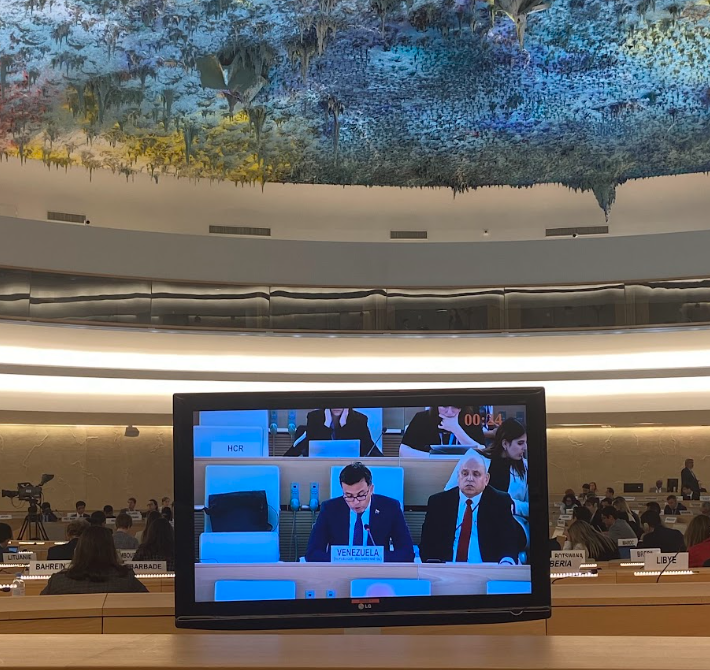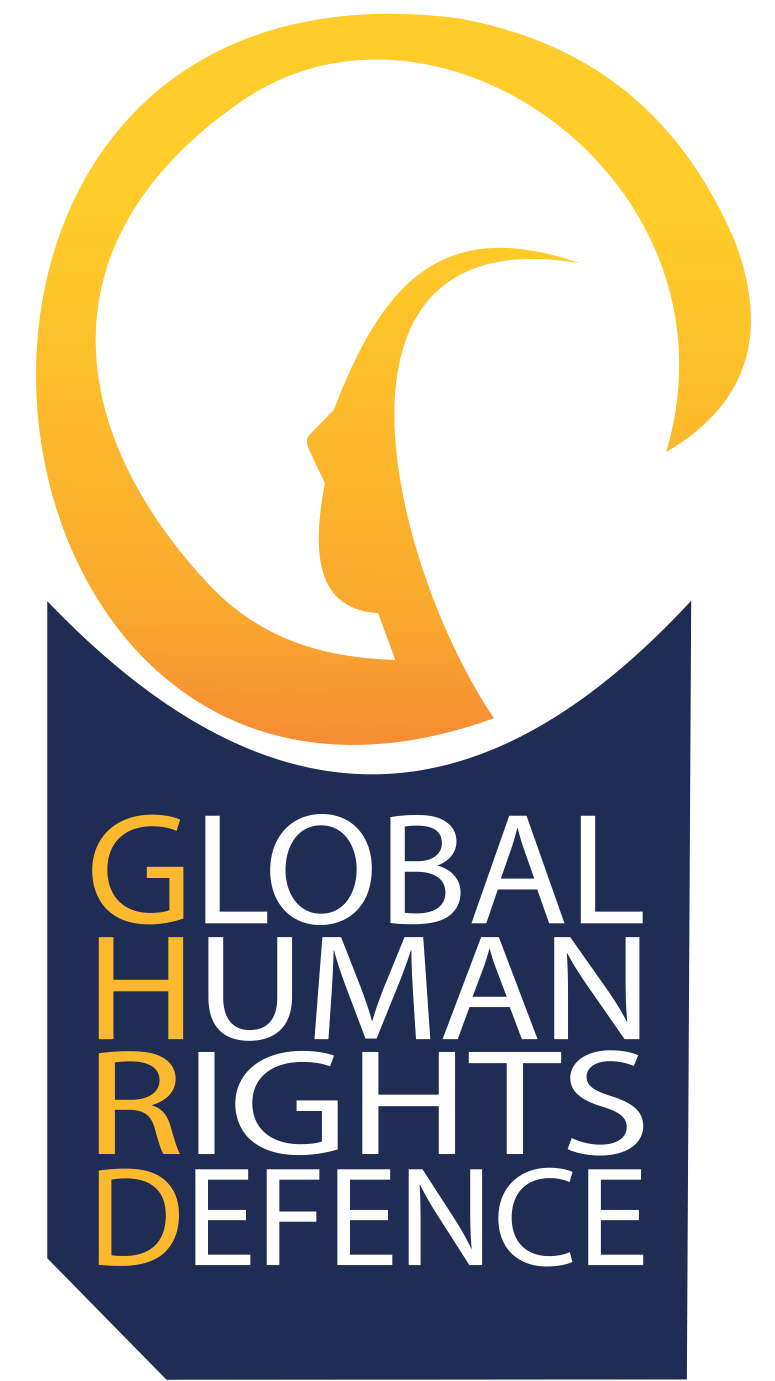- info@ghrd.org
- Mon-Fri: 10.00am - 06:00pm
Interactive Discussion with Fact Finding Mission on the Bolivarian Republic of Venezuela

Interactive Discussion with Fact Finding Mission on the Bolivarian Republic of Venezuela
26-10-2023
Topic: United Nations
Tsedenia Gigar Getaneh
Team UN Geneva Researcher,
Global Human Rights Defence.
The 54th Session of the Human Rights Council in Geneva engaged in an interactive discussion with the Fact-Finding Mission on the Bolivarian Republic of Venezuela.
Marta Valinas, who serves as the chair of the Independent International Fact-Finding Mission on the Bolivarian Republic of Venezuela, presented an overview of the Mission’s findings. They have conducted investigations delving into the various methods employed by the Venezuelan government to suppress individuals critical of the government, and the concurrent stifling of civil society. The mission also scrutinised State institutions implicated in committing human rights violations, as well as the newly established management directorate within the Venezuelan police. The Mission had carried out 256 confidential interviews and 4 discussion groups. The Mission’s ultimate determination was that human rights abuses are ongoing and are not isolated occurrences, but rather part of a more comprehensive strategy to quell opposition. Venezuela continues with repressive measures, resulting in a pervasive atmosphere of fear and self-censorship.
Despite international human rights mechanisms’ calls for a change in policy, the State has persisted in its repressive actions. The Fact-Finding Mission expanded its mandate to investigate the various ways in which the authorities violated human rights. It documented instances of selective repression against trade unionists, journalists, political leaders, and their relatives, as well as civil society, political parties, and the media. Peaceful protestors and those who openly question government officials face arbitrary criminal proceedings, while political parties encounter arbitrary actions. The country has almost no independent media outlets due to stringent state controls. Those media outlets that resist face arbitrary measures, resulting in a growing trend of self-censorship. The democratic and civic space continue to shrink, and the independence of the People’s Ombudsperson was severely compromised. With the upcoming presidential elections in 2024, there are concerns that selective repression of civil society and political leaders might escalate.
Ms. Valinas mentioned that the second phase of the investigation was centered around the formed Directorate of Strategic and Tactical Action within the Bolivarian Police Force. There were substantial grounds to suspect that the previously disbanded Specialised Action Forces Unit had been involved in extrajudicial killings, potentially constituting crimes against humanity. This new Directorate of Strategic and Tactical Action had been officially established in 2022, and the Fact-Finding Mission determined that it effectively continued the activities of the disbanded Specialised Action Forces. Within this new Directorate, which comprised 50 leadership positions, 10 were filled by individuals identified in the Mission’s earlier reports as there was a belief that they are responsible for international crimes. There were allegations connecting this new group to numerous assassinations and over 300 detentions. These allegations warranted a more thorough and comprehensive investigation.
The Bolivarian Republic of Venezuela argued that the imposition of the Mission’s mandate upon Venezuela was driven by political motivations and stood in stark contrast to the principles of the human rights system. It contended that the Mission, which was forced upon cynically used human rights as a pretext to meet agenda in their political affairs and commercial reasons.
Venezuela further accused the Mission of exceeding its designated scope and manipulating and falsifying data. Moreover, they emphasised that the true root causes of their current socio-economic challenges were unilateral coercive measures, yet these were clearly omitted from the discussion. The State made a firm rejection of the work, allegations, and even the existence of what it termed a ‘Pseudo Mission’.
Furthermore, Venezuela highlighted its commitment to enhancing technical cooperation with the Office of the High Commissioner, making progress on agreed objectives with tangible results. Venezuela expressed its dedication to promoting and safeguarding human rights through engagement with the Council, but completely rejected the interventionist and punitive measures that it believed were based on unfounded and persistent falsehoods, causing harm to many nations.
The main Speakers in this discussion on Venezuela were the European Union, Belgium on behalf of a group of countries, Canada on behalf of a group of countries ,Germany, Switzerland, USA, Brazil, Russia, Iran, Syria. Additionally, several NGOs participated in the discussion, including the International Association of Democratic Lawyers and Amnesty International.
The Discussion
During the discussion, several speakers expressed ongoing concerns regarding the political, economic, social, and humanitarian crises in Venezuela. They highlighted that Venezuelan authorities continue to take actions that undermine democracy, the rule of law, and human rights. Recent developments in the country indicate a persistent attack on civic and democratic space, affecting civil society actors. The systematic restriction of civil society and civic space raises significant concerns, especially regarding the criminalisation of union leaders for advocating for better wages. These convictions were seen as an attempt to deter others from demanding improved working and living conditions, which is part of a broader pattern of undermining the population’s social and economic rights. Additionally, social leaders, human rights defenders, and journalists are facing obstacles in exercising their civil and political rights, including freedom of expression.
Certain speakers welcomed the report’s focus on civic and democratic space, and emphasised the importance of constructive engagement among all stakeholders in a Venezuelan-led dialogue. They stressed the need for close monitoring of the situation, especially with the presidential and legislative elections scheduled for 2024 and 2025. Free and fair elections are seen as crucial for achieving a peaceful and democratic solution to the crisis. Speakers also emphasised the importance of ending impunity, holding perpetrators of human rights violations accountable through impartial investigations, and releasing political prisoners.
The Fact-Finding Mission’s message was clear: the human rights situation in Venezuela has not improved since the last report, and gross human rights violations continue to occur. Venezuela was urged to protect, respect, and fulfill the rights to freedom of expression, opinion, peaceful assembly, and association. This includes ensuring the safety of human rights defenders, humanitarian workers, journalists, political opponents, and trade unionists. Strengthening civic space was also considered essential for ensuring free, fair, credible, transparent, and inclusive upcoming elections.
Switzerland called upon Venezuelan authorities to cooperate fully with and implement all recommendations from the United Nations’ human rights mechanisms, including the Office of the High Commissioner for Human Rights and the International Criminal Court. The necessity of granting unhindered access to Venezuela for the Fact-Finding Mission was further emphasised. It is imperative for Venezuelan authorities to guarantee equal political and public participation rights, freedom of expression and opinion, access to information, and peaceful association and assembly for all Venezuelans.
Syria raised concerns about the repeated extension of the Fact-Finding Mission’s mandate without the State’s consent, and the negative impact of unilateral coercive measures imposed by certain countries on Venezuela’s economic development and the livelihood of its people. They called for an immediate end to these measures and recognised the efforts of the Venezuelan government to support the human rights and livelihoods of its citizens.
Russia, expressed regret that some states opt for making accusations and issuing threats rather than engaging in constructive dialogue. They emphasize that no country in the world is without human rights challenges, acknowledging the universal nature of these issues. Russia raises concerns about the sanctions imposed by Western nations and the adverse effects they have on ordinary people. They call for an end to what they view as economic suffocation imposed on the Venezuelan people.
During the discussion, several questions were put to the panel regarding how the international community can contribute to the promotion of an open civic and democratic space in Venezuela; the Mission’s assessment of the use of counter-terrorism measures against those advocating for workers’ rights and trade unions; whether the Mission plans to investigate the practices of Venezuelan security forces and their excessive use of violence; the Mission’s collaboration with Venezuela and the Office of the High Commissioner for Human Rights leading up to the upcoming elections; progress in accountability mentioned in the report; and how States could support civil society actors facing challenges in Venezuela.
Concluding remarks
In the concluding remarks, Patricia Tappatá Valdez, a member of the Independent International Fact-Finding Mission on the Bolivarian Republic of Venezuela, thanked countries for their questions. She emphasised the Mission’s commitment to independence, impartiality, and objectivity, with a focus on not causing harm to victims or witnesses. The Mission’s central objective is to continue international scrutiny and monitoring, particularly regarding attacks on freedom of expression and hostility towards journalists. Clear and consistent rules for the political system in Venezuela were deemed essential, and the international community was urged to ensure the independence of relevant institutions. Effective changes were called for to enable civil society to operate freely in the country, and the Fact-Finding Mission committed to addressing issues related to security forces.
Francisco Cox Vial, another member of the Independent International Fact-Finding Mission, highlighted the importance of accountability, including conducting investigations while respecting the human rights of victims. He addressed the misconception of a false dichotomy between the Office of the High Commissioner, the International Criminal Court, and the Mission. Cox Vial rejected the arbitrary detention and torture of trade union leaders, emphasising the importance of including such incidents in the report.
The discussion highlighted the complex and contentious nature of the human rights situation in Venezuela, with different members states and NGOs holding different views on the causes and solutions.
Search
ABOUT US
Global Human Rights Defence (GHRD) is a dedicated advocate for human rights worldwide. Based in The Hague, the city of peace and justice. We work tirelessly to promote and protect the fundamental rights of individuals and communities. Our mission is to create a more just and equitable world, where every person's dignity and freedoms are upheld. Join us in our journey towards a brighter future for all.
ALL CONTACTS
-
Riviervismarkt 5-unit 2.07
2513 AM The Hague - Phone +31 62 72 41006
- info@ghrd.org
-
10:00am - 06:00pm
Saturday & Sunday Closed
SUBSCRIBE
Stay informed and be part of change - Subscribe to our newsletter today!
- Copyright of GHRD 2023. Powered by Desmantle Studio.


Leave a Reply